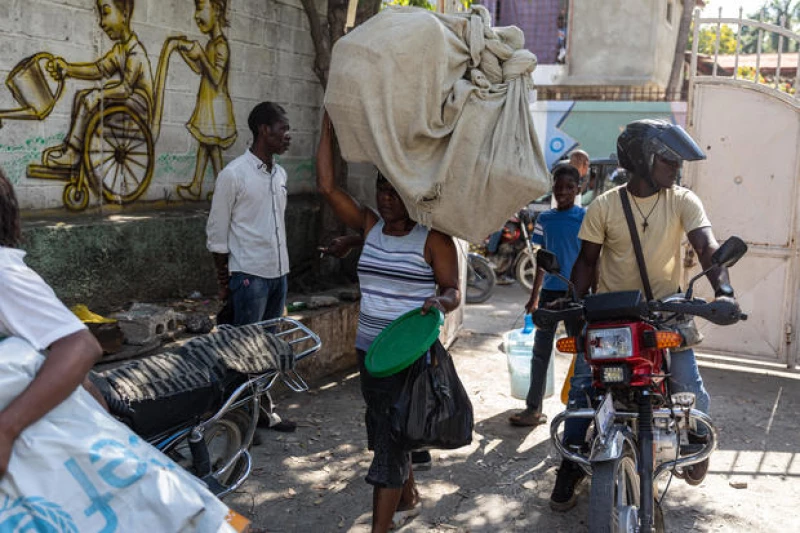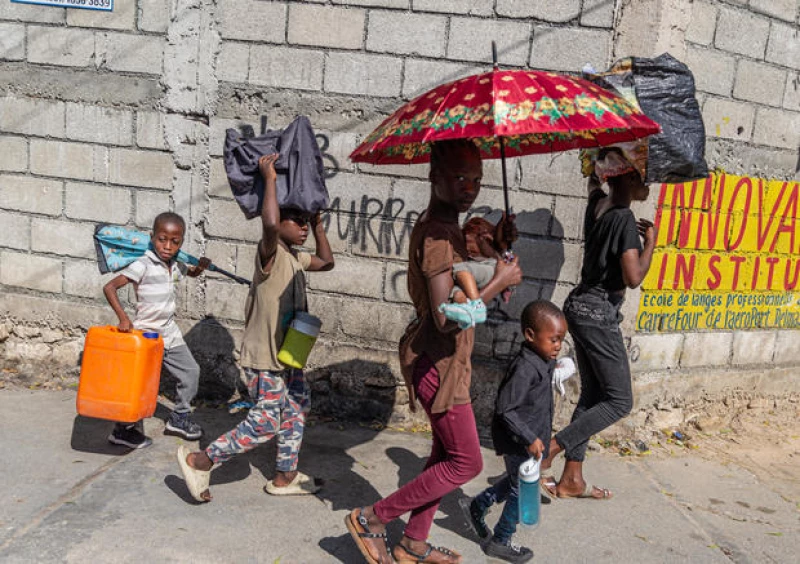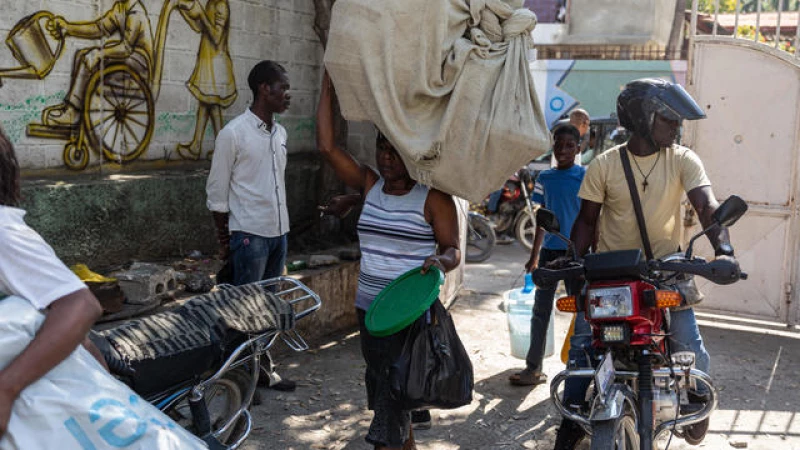The U.S. government announced on Saturday its plans to organize a charter flight for individuals with valid passports to travel from Haiti to the U.S.
Due to the ongoing violence in the country, the flight will depart from the Cap-Haitien International Airport, which has limited travel capacity. The State Department has advised interested citizens and eligible family members to complete an intake form available on their website to secure a seat on the flight.
Officials have cautioned that the journey from the capital city of Port-au-Prince to Cap-Haitien is hazardous and suggested that individuals should only consider the flight if they can safely reach the airport in Cap-Haitien. At present, the government is unable to provide ground transportation to the airport but is exploring alternatives for departures from Port-au-Prince, which is approximately 120 miles away from the airport.
The country is grappling with escalating violence from criminal gangs, leading some experts to describe the situation as a low-scale civil war. Reports indicate that 1.4 million Haitians are facing severe food shortages, with over 4 million people in need of food assistance, often going without meals for extended periods, according to humanitarian organizations.
"Haiti is facing a protractive and mass hunger," Jean-Martin Bauer, Haiti director for the United Nation's World Food Program, told The Associated Press. He noted that Croix-des-Bouquets, in the eastern part of Haiti's capital, "has malnutrition rates comparable with any war zone in the world."
Gangs block aid
Officials are trying to rush food, water and medical supplies to makeshift shelters and other places as gang violence suffocates lives across Port-au-Prince and beyond, with many trapped in their homes.
Only a few aid organizations have been able to restart since Feb. 29, when gangs began attacking key institutions, burning police stations, shutting down the main international airport with gunfire and storming two prisons, releasing more than 4,000 inmates.
The violence forced Prime Minister Ariel Henry to announce early Tuesday that he would resign once a transitional council is created, but gangs demanding his ouster have continued their attacks in several communities.
Bauer and other officials said that the gangs are blocking distribution routes and paralyzing the main port, and that the World Food Program's warehouse is running out of grains, beans and vegetable oil as it continues to deliver meals.
"We have supplies for weeks. I'm saying weeks, not months," Bauer said. "That has me terrified."
Inside the makeshift shelter at the school, things were a bit more orderly, with scores of people standing in line for food. More than 3,700 shelter residents compete for a place to sleep and share a hole in the ground for a toilet.
Erigeunes Jeffrand, 54, said he used to make a living selling up to four wheelbarrow-loads of sugar cane a day, but that gangs recently chased him and his four children out of their neighborhood.
"My home was completely destroyed and robbed," he said. "They took everything I have. And now, they're not even letting me work."
He sent his two youngest children to live with relatives in Haiti's more quiet countryside while the two eldest live with him at the shelter.
"Can you believe I had a home?" he said. "I was making ends meet. But now, I'm just depending on what people provide me to eat. This is not a life."

More than 200 gangs are believed to operate in Haiti, with nearly two dozen concentrated in Port-au-Prince and surrounding areas. They now control 80% of the capital and are vying for more territory.
Scores of people have died in the most recent attacks, and more than 15,000 have been left homeless.
"There are a lot of desperate people"
Marie Lourdes Geneus, a 45-year-old street vendor and mother of seven children, said gangs chased her family out of three different homes before they ended up at the shelter.
"In the midst of all this chaos, there are many individuals like me, facing desperation after losing everything they once had," she shared. "The life I'm living now is a nightmare. I worked hard in life, but here I am, struggling to survive."

She recounted how she braves the streets occasionally to sell beans in order to buy extra food for her children, who sometimes go to bed hungry, having only one meal a day. However, her efforts are often thwarted by armed men, causing her to drop her goods as she flees.
This dire situation has hindered the operations of aid organizations like Food for the Hungry, just when their assistance is needed the most.
"We are at a standstill, lacking funds and unable to transport the supplies from our warehouse," lamented Boby Sander, the organization's director in Haiti. "The situation is catastrophic."
Food for the Hungry runs a cash-based program that supports around 25,000 families annually by providing financial aid. However, ongoing looting and attacks on banks have severely disrupted the system. "Since Feb. 29, we have been completely paralyzed," Sander added.
One morning, the aroma of cooking rice attracted a crowd of adults and teenagers to a sidewalk near a building where aid workers were preparing meals to distribute to shelters in another part of the city.
As they approached people entering and exiting the building, their voices trembled with desperation. "Can you help me get a plate of food? We haven't had anything to eat today yet," they pleaded. But their cries fell on deaf ears. The food was designated for the shelter located at the school.
"We know it's not much," lamented Jean Emmanuel Joseph, the overseer of food distribution for the Center for Peasant Organization and Community Action. "It's unfortunate that we are unable to provide them with more."

Within the shelter, some adults and children attempted to return for a second serving. However, they were promptly reminded, "You already had a plate. Allow others to have one."
Jethro Antoine, a 55-year-old resident of the shelter, clarified that the food is exclusively intended for residents. Despite this, little can be done to prevent outsiders from infiltrating. "If you raise concerns about it, you'll be marked as an adversary, and you might even face severe consequences," he cautioned.
USAID disclosed that approximately 5.5 million individuals in Haiti - roughly half of the population - require humanitarian assistance. In addition to the $33 million previously announced, they pledged an additional $25 million.
Bauer, representing the U.N., highlighted that the humanitarian appeal for Haiti this year has only secured less than 3% of the necessary funding. The World Food Program urgently requires $95 million within the next six months.
"Conflict and hunger in Haiti are intertwined," he expressed with concern. "I fear for the direction in which we are heading."







